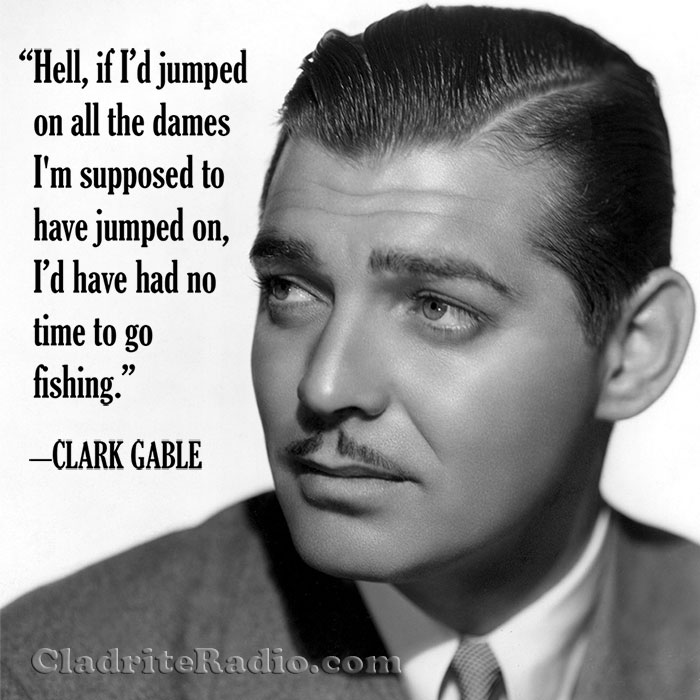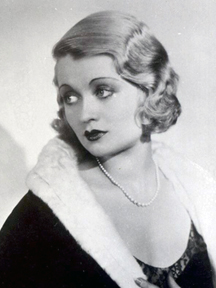Here are 15 things you should know about Clark Gable, born 121 years ago today. Frank Capra once said of him, “They had him playing these big, huff-and-puff he-man lovers, but…he was a down-to-earth guy.”
Tag: William Boyd
Happy 116th Birthday, Clark Gable!
Clark Gable was born William Clark Gable 116 years ago today in Cadiz, Ohio. In his day, he was known as the King of Hollywood or, often, just as the King. Here are 10 CG Did-You-Knows:
- Gable was named after his father, William, who was an oil well driller, but even as a child, he was referred to by his middle name or sometimes as Billy. His birth certificate mistakenly listed Gable as female.
- Gable’s stepmother (his birth mother died when he was young) encouraged his interest in music, teaching him to play piano. He later took up brass instruments and at age 13, he was the only teen to play in the men’s town band. Gable’s father encouraged him from an early age to be well-dressed and well-groomed.
- At 17, Gable decided he decided to pursue a career in the theatre and by 21, he was touring in stock companies, along with jobs in the oil fields and working with horses. Josephine Dillon, an acting coach and theatrical manager in Portland, Oregon, set out to remake Gable from head to toe. She paid for him to get new teeth, she built up his once-slight physique with a proper diet and strenuous exercise and helped him improve his movements and posture. She also worked at length to lower his high-pitched voice and improve his diction.
- Dillon, who was 17 years Gable’s senior, also financed Gable’s relocation from Portland to Hollywood in 1924, where she officially became his manager and his wife. He changed his professional name from W. C. Gable to Clark Gable and began to work as an extra and a bit player in silent short and features.
- When no leading film roles were in the offing, Gable returned to the stage, acting for a season with the Laskin Brothers Stock Company in Houston, Texas, where he played a variety of roles and gained valuable experience. Finally, with the ascent of talking pictures, Gable’s stock as an actor rose as well. He was offered a contract with MGM in 1930. His first role was as a rough-hewn villain in a William Boyd western, The Painted Desert (1930). His imposing stature and now-powerful speaking voice made a quick hit with moviegoers (especially female ones).
- Many of Gable’s early roles were tough guys, gangsters and villains, and though no less an authority than Darryl F. Zanuck had once said of Gable, “His ears are too big and he looks like an ape,” he was finding himself cast opposite popular leading ladies of the day, including Joan Crawford, Barbara Stanwyck, Norma Shearer and even Greta Garbo (with whom he shared a mutual dislike—she thought his acting wooden; he thought her a snob).
- Despite long being known as the King of Hollywood, Gable was never No 1 at the box office in a given year, but year after year, he ranked near the top, as the fortunes of other actors rose and fell. His breakthrough role was his Oscar-winning performance in Frank Capra‘s It Happened One Night in 1934, opposite Claudette Colbert. That classic film won the Best Picture Oscar to go along with Gable’s Best Actor nod. Capra considered the role of Peter Warne in the film the closest to Gable’s actual personality: “It Happened One Night is the real Gable,” he wrote. “He was never able to play that kind of character except in that one film. They had him playing these big, huff-and-puff he-man lovers, but he was not that kind of guy. He was a down-to-earth guy, he loved everything, he got down with the common people. He didn’t want to play those big lover parts; he just wanted to play Clark Gable, the way he was in It Happened One Night, and it’s too bad they didn’t let him keep up with that.”
- Gable is said to have been Adolph Hitler‘s favorite actor, and it’s been reported that Hitler offered a reward to anyone who could capture Gable, then flying combat missions over Germany, and bring him to Hitler unharmed. The reward went unclaimed.
- Gable played a newspaper reporter in nine different pictures, more than any other type of role, but late in life, he expressed regret that he hadn’t appeared in more westerns, the genre he most enjoyed working in.
- Gable was married five times, the first two times to women many years his senior, but it is generally accepted that his third Wife, actress Carole Lombard, was the great love of his life. She even got Gable, a lifelong Republican, to support Franklin Delano Roosevelt for president. It’s said that Lombard’s tragic death in a plane crash in 1942 left Gable so bereft that he immediately enlisted in the Army Air Corps and was absent from the silver screen for three years.
Happy birthday, Clark Gable, wherever you may be!

Hollywood Undressed, Chapter Twelve
The twelfth chapter from Hollywood Undressed, a 1931 memoir attributed to the assistant of masseuse and health guru Sylvia Ulback, a.k.a. Sylvia of Hollywood (but actually ghost-written for Sylvia by newspaper reporter and screenwriter James Whittaker), relates the special challenge she faced in treating actress Constance Bennett , who needed to gain weight, not lose it.
, who needed to gain weight, not lose it.
THE TORTURE CHAMBER
 THE boss’s bungalow on the Pathé lot got to be a hangout. Rumors got around about what went on in there. The little stucco shack got christened the Torture Chamber.
THE boss’s bungalow on the Pathé lot got to be a hangout. Rumors got around about what went on in there. The little stucco shack got christened the Torture Chamber.Ann Harding and her husband, Harry Bannister, were a bit responsible for the reputation of the inner chamber where the boss did her pounding. At the time, Ann was pretty unfit, meaning somewhat overweight, and she was pretty vocal about letting the world know it when Sylvia was pinching pleats out of her.
Moreover, Ann refused to see that a movie career and all the money were worth the bother and would intimate that, any time she got fed up, she would leave the movies flat and go back East.
So the Pathé executives would sneak over and implore Sylvia to do two things: take flesh off Ann but not hurt her. Which two things don’t go together. So Sylvia would compromise by taking the flesh off Ann and hurting her, same as with anyone else. Bannister would hang around outside the shack while Ann was getting her treatment, smoking cigarettes nervously, like a man waiting to hear if it’s a boy, and when Ann let out a yell, he would bust in with his hair bristling and his jaw set and stop the horrible proceedings.
As a matter of fact, a vigorous massage, when the client’s trouble is fat, does hurt a bit. But the reason for the howls that arose in Sylvia’s operating room was more that pampered sensitiveness of the patients than any agony connected with the method.
The real reason for the phenomenal success of massage in the film colony is that’s a short-cut to physical conditioning, without which beauty turns into so much lard, and it’s a method where the responsibility is shifted to other shoulders. The victims on Sylvia’s slab in the back room of the Pathé bungalow took punishment—plenty! But not without howls and shrieks of agony that drew the attention of the executive department. On a hot, quiet day the outcries from the bungalow would reach the street outside the lot.
It wasn’t the public scandal the Pathé executives minded. What worried them was the possible effect on morale on the lot. It was getting so that the frightened actors made up all sorts of excuses to get out of taking their turns on the slab. So the Pathé people went into conference and decided to put a radio set with an oversize loud-speaker in Sylvia’s bungalow. The plug for switching on the music was put handy to the slab. When Sylvia was ready to go to work on a pair of bulging hips or an inflated tummy, she just gave the radio switch a slip and the loud-speaker started a squawk that drowned out the cries of the victim.
